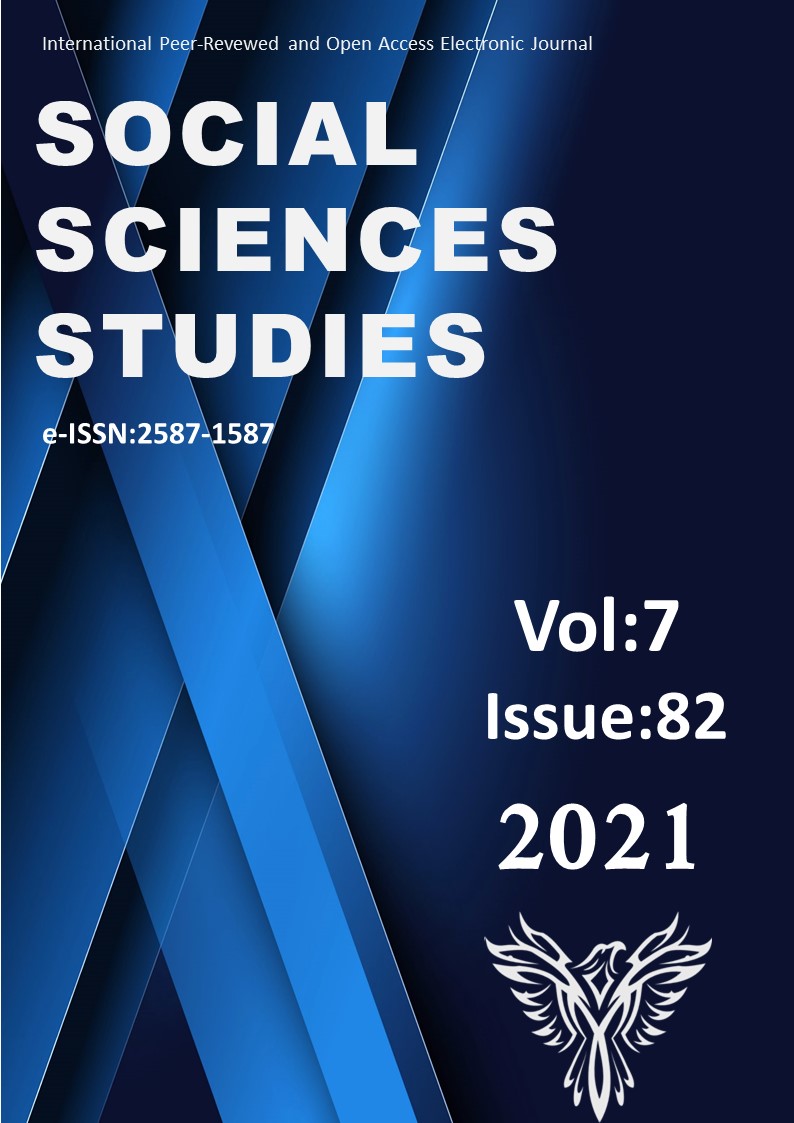PARÇALANMIŞ AİLELERDEN GELEN ERGENLERİN UYUM VE OTOMATİK DÜŞÜNCELERİ ARASINDAKİ İLİŞKİNİN İNCELENMESİ
Author :
Abstract
Bu araştırmada parçalanmış ailelerden gelen ergenlerin uyum sorunları ve otomatik düşünceleri arasındaki ilişkinin incelemesi amaçlanmıştır. Araştırmanın çalışma grubunu Niğde ili ve ilçelerinde öğrenim gören parçalanmış ailelerden gelen 9.10.11. ve 12. sınıf öğrencileri oluşturmuştur. Araştırmaya 134 kız 74 erkek toplam 208 öğrenci katılmıştır. Araştırmada veri toplamak amacıyla Kişisel Bilgi Formu, Meriç (2007) tarafından Türkçe uyarlaması yapılmış Reynolds Ergenler İçin Uyum Tarama Envanteri ve Şahin ve Şahin (1992) tarafından Türkçe uyarlaması yapılmış Otomatik Düşünceler Ölçeği kullanılmıştır. Elde edilen verilerin çözümlenmesinde Bağımsız Gruplar “t” Testi, Tek Yönlü Varyans Analizi (ANOVA),Çoklu Doğrusal Regresyon Analizi ve Pearson Momentler Çarpımı Korelasyonundan yararlanılmıştır. Araştırma sonuçlarında parçalanmış ailelerden gelen ergenlerin uyum sorunları ile otomatik düşünceleri arasında pozitif yönde yüksek düzeyde ilişki bulunmuştur. Uyum sorunları ve otomatik düşünceler cinsiyet değişkeni açısından anlamlı olarak farklılaşırken, parçalanma nedeni ve parçalanmanın üzerinden geçen zamanın uyum sorunları ve otomatik düşünceler üzerinde anlamlı bir farklılık bulunmamıştır. Çoklu regresyon analizleri sonuçlarına göre otomatik düşünceler ölçeğinin kişisel uyumsuzluğa yönelik düşünceler ile yalnızlığa yönelik düşünceler alt boyutları, öfke kontrol problemi ve antisosyal davranışlar üzerinde önemli bir yordayıcıdır. Otomatik düşünceler ölçeği yalnızlığa yönelik düşünceler ve ümitsizliğe yönelik olumsuz düşüncelerin duygusal sıkıntılar üzerinde önemli yordayıcı olduğu bulunmuştur.
Keywords
Abstract
This study aimed to examine the relationship between adjustment problems and automatic thoughts of adolescents from broken families. The study group up this investigation consist of broken families 9,10,11 and 12th grade students studying in Niğde province and its district. A total of 208 students, 134 female, 74 male, participated in the study. In the study, Personal Information Form was used to collect data, Reynolds Adolescent Adjustment Screening Inventory to Turkish by Meriç (2007) and Automatic Thoughts Scale adapted to Turkish by Şahin and Şahin (1992). Independent groups "t" test, one-way analysis of variance (ANOVA), Multiple Linear Regression Analysis and Pearson product-moment correlation were used to analyze the obtained data. The findings of the study found a high level of positive correlation between the adjustment problems and automatic thoughts of the young people who came from families with broken families. While adjustment problems and automatic thoughts differed significantly in terms of the gender variable, it was determined that the reason for the breakdown and the time passed after the breakup did not differ significantly. According to the results of multiple regression analyzes, the thoughts about personal disharmony and thoughts about loneliness sub-dimensions of the automatic thoughts scale are an important predictor of anger control problem and antisocial behaviors. The automatic thoughts scale found that thoughts about loneliness and negative thoughts about hopelessness were significant predictors of emotional distress.
Keywords
- Dabanlı, R. & Alver, B. (2021). “Parçalanmış Ailelerden Gelen Ergenlerin Uyum Ve Otomatik Düşünceleri Arasındaki İlişkinin
- İncelenmesi” International Social Sciences Studies Journal, (e-ISSN:2587-1587) Vol:7, Issue:82; pp:2069-2079 PARÇALANMIŞ AİLELERDEN GELEN ERGENLERİN UYUM VE OTOMATİK DÜŞÜNCELERİ ARASINDAKİ İLİŞKİNİN İNCELENMESİ 1 Investigatıon of the Relationship Between Adult and Automatic Thoughts Of Adolescents From Broken Family Psikolojik Danışman, Rumeysa DABANLI Milli Eğitim Bakanlığı, Psikolojik Danışman, Niğde/TÜRKİYE ORCID ID: https://orcid.org/0000-0002-0560-4490 Prof. Dr. Birol ALVER Kırıkkale Üniversitesi, Eğitim Fakültesi, Rehberlik ve Psikolojik Danışmanlık Anabilim Dalı, Kırıkkale/TÜRKİYE ORCID ID: https://orcid.org/0000-0001-9654-0965 ÖZET Bu araştırmada parçalanmış ailelerden gelen ergenlerin uyum sorunları ve otomatik düşünceleri arasındaki ilişkinin incelemesi amaçlanmıştır. Araştırmanın çalışma grubunu Niğde ili ve ilçelerinde öğrenim gören parçalanmış ailelerden gelen 9.10.11. ve 12. sınıf öğrencileri oluşturmuştur. Araştırmaya 134 kız 74 erkek toplam 208 öğrenci katılmıştır. Araştırmada veri toplamak amacıyla Kişisel Bilgi Formu, Meriç (2007) tarafından Türkçe uyarlaması yapılmış Reynolds Ergenler İçin Uyum Tarama Envanteri ve Şahin ve Şahin (1992) tarafından Türkçe uyarlaması yapılmış Otomatik Düşünceler Ölçeği kullanılmıştır. Elde edilen verilerin çözümlenmesinde Bağımsız Gruplar “t” Testi, Tek Yönlü Varyans Analizi (ANOVA),Çoklu Doğrusal Regresyon Analizi ve Pearson Momentler Çarpımı Korelasyonundan yararlanılmıştır. Araştırma sonuçlarında parçalanmış ailelerden gelen ergenlerin uyum sorunları ile otomatik düşünceleri arasında pozitif yönde yüksek düzeyde ilişki bulunmuştur. Uyum sorunları ve otomatik düşünceler cinsiyet değişkeni açısından anlamlı olarak farklılaşırken, parçalanma nedeni ve parçalanmanın üzerinden geçen zamanın uyum sorunları ve otomatik düşünceler üzerinde anlamlı bir farklılık bulunmamıştır. Çoklu regresyon analizleri sonuçlarına göre otomatik düşünceler ölçeğinin kişisel uyumsuzluğa yönelik düşünceler ile yalnızlığa yönelik düşünceler alt boyutları, öfke kontrol problemi ve antisosyal davranışlar üzerinde önemli bir yordayıcıdır. Otomatik düşünceler ölçeği yalnızlığa yönelik düşünceler ve ümitsizliğe yönelik olumsuz düşüncelerin duygusal sıkıntılar üzerinde önemli yordayıcı olduğu bulunmuştur. Anahtar Kelimeler: Parçalanmış Aile, Uyum Sorunları, Otomatik Düşünce ABSTRACT





